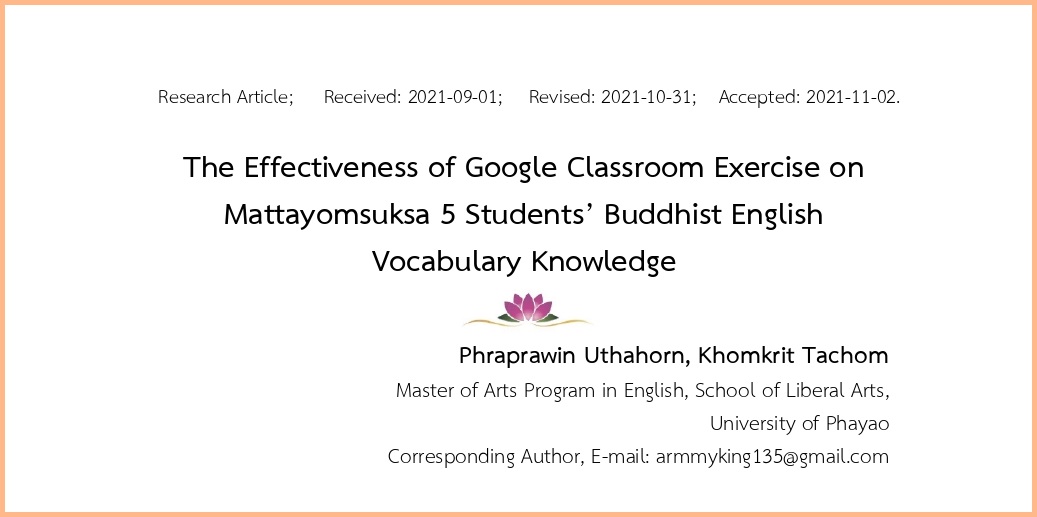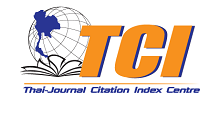The Effectiveness of Google Classroom Exercise on Mattayomsuksa 5 Students’ Buddhist English Vocabulary Knowledge
คำสำคัญ:
Google Classroom Exercise, Buddhist English Tourism, Buddhist Vocabularyบทคัดย่อ
The purposes of this study were: 1) to examine the effectiveness of the Google Classroom Vocabulary Learning Package (GCVLP) for the charity school students based on the standard criteria of 80/80; 2) to compare the vocabulary learning achievement of the charity school students before and after learning through the GCVLP; and 3) to study the charity school students’ satisfaction with learning through GCVLP. The samples were Mattayomsuksa 5 students at Wisutwittayakorn School (charity school) selected by one group design. The research instruments were Google Classroom exercises, pretest and posttest, and questionnaire. The data were analyzed by means of descriptive statistics, percentage, mean, standard deviation, t-Test, and the efficiency of the learning through Doing Activities (E1) and Achievement Test (E2).
Results indicated that 1) the efficiency of the exercises was at 82.7/86.6 in theoretical achievement which was higher than the criteria set at 80/80; 2) students’ learning achievement after using the exercises showed the difference between the means of the pretest and posttest was significant at .05; and 3) the average score of students’ contentment to the exercises was at a high level (4.49) overall. The body of knowledge gained from the present study indicated that students can learn and practice English vocabulary through GCVLP.
Downloads
เอกสารอ้างอิง
Aldo, O. (2020). The Effectiveness of Using Google Classroom to Teach Student’s Vocabulary Mastery on Action Verb at the Ninth Grade Students of MTs Al Mina Bandungan in the Academic Year 2020/2021. (Master’s Thesis). Education Faculty State Institute for ISLAMIC Studies (IAIN). Indonesia.
Chuleetham, S., et al. (2020). The Comparison of the Teaching and learning Achievement Between the Use of the Active Learning Teaching Using innovation Teaching Google Classroom with regular Teaching Passive Learning Case Study Teaching and learning of Thai History Courses High School Grad 12 Thepmitesuksa School. Integrated Social Science Journal. 7 (2), 203-220.
Fai Muen Wai, R. and Ratsida, P. (2014). Learning Achievement and Students’ Satisfaction toward Instruction via Google Classroom in the BNS 102 Course (Culture and Health). (Master’s Thesis). Rangsit University. Pathum Thani.
Feli, S. and Katemba, C. (2021). Vocabulary Enhancement through Memrise and Google Classroom, Language Literacy. Journal of Linguistics Literature and Language Teaching. 5 (1), 228-241.
Li, Z G. and Song, M. Y. (2007). The Relationship between Traditional English Grammar Teaching and Communicative Language Teaching. US-China Education Review. 4 (1), 62-65.
Maliphai, P. (2020). A Development of Online Lesson in Basic Chinese Based on Pinyin Using Google Classroom for Grade 9th Students. (Master’s Thesis). Burapha University. Chonburi.
Office of the National Education Commission. (2011). The Thailand Educational Reform Project: School Reform Policy. Bangkok: Office of the National Education Commission.
Setrit, A. (2020). The Application of Google Classroom in Communicative Language Teaching (CLT) Grade 11. Journal of Teacher Professional Development. 1 (1), 65-74.
Silphiphat, S., et al. (2008). Teaching through Electronic Systems International Economics Course by Using T5 Model. Research Report. Sukhothai Thammathirat Open University.
Singhad, S., et al. (2019). Achievement and Satisfaction of Nursing Students Exposed to Google Classroom in Nursing Information Technology. Journal of Humanities and Social Sciences. 9 (2), 124-137.

ดาวน์โหลด
เผยแพร่แล้ว
รูปแบบการอ้างอิง
ฉบับ
ประเภทบทความ
สัญญาอนุญาต
ลิขสิทธิ์ (c) 2022 วารสารบัณฑิตแสงโคมคำ

อนุญาตภายใต้เงื่อนไข Creative Commons Attribution-NonCommercial-NoDerivatives 4.0 International License.





